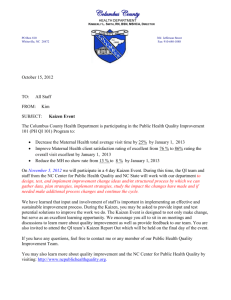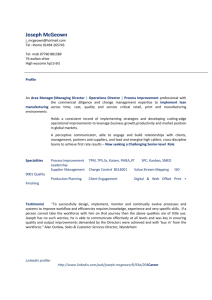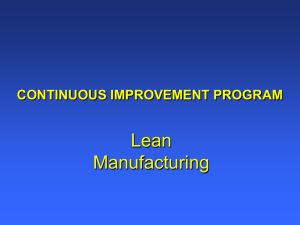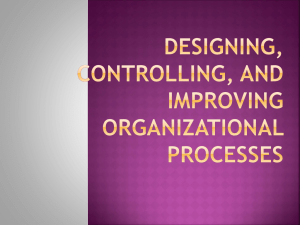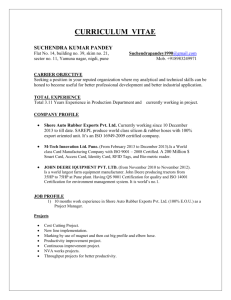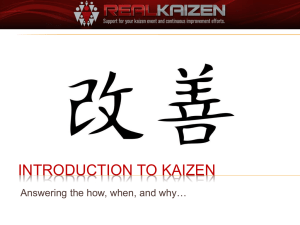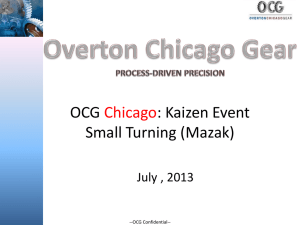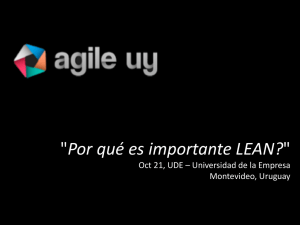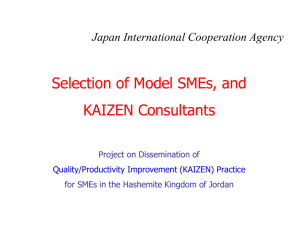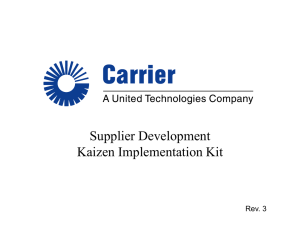Lean RA
advertisement
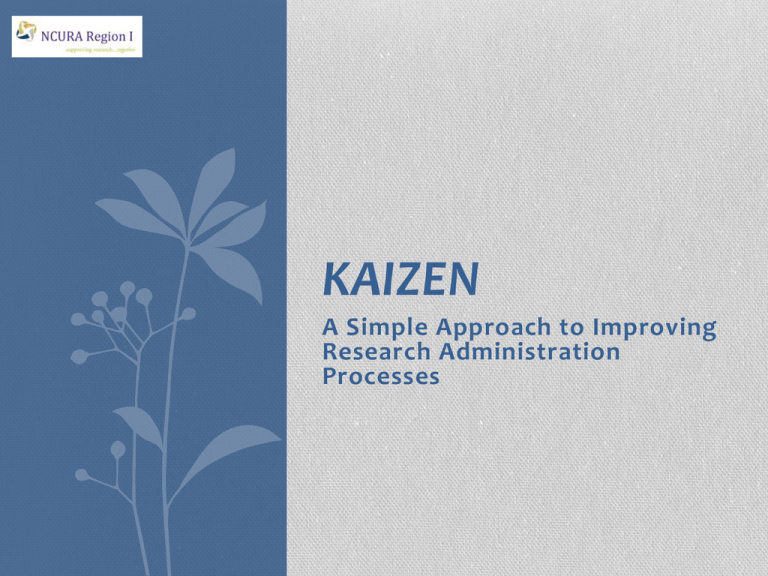
KAIZEN A Simple Approach to Improving Research Administration Processes Good Change Kai = change Zen = good A journey of a thousand miles begins with a single step. Spring 2013 Kaizen An inclusive philosophy and practice of productive improvement, which is made incrementally and continuously. A transformative approach to improving quality while reducing costs. Spring 2013 Principles of Kaizen Participation, empowerment Define, monitor and redefine standards Steady, constant Small, incremental change Root cause analysis Spring 2013 Kaizen Value Quality Dependability Discipline Spring 2013 Kaizen Discipline And the value of teams. Spring 2013 Kaizen Practices Plan > Do > Check > Act > PLAN: ID the problem, suggest suggestions; DO: Implement; CHECK: Measure and assess, seek feedback; ACT: Evaluate; design improvements. Spring 2013 Kaizen Practices Plan > Do > Check > Act > Spring 2013 Kaizen Practices Focus on the Process Challenge the Status Quo Emphasize Training (Learning Organization) Invite Feedback Spring 2013 Kaizen Practices Feedback Improvement is everyone’s responsibility. Spring 2013 Lean Improvements are designed to create value by eliminating waste. Waste = additional resources (time, money, activity) that do not create any value to the customer. Spring 2013 Lean Goal of engaging in the Kaizen practice is not perfection, rather it is about achieving excellence Spring 2013 Mura Muri Muda Uneveness (Mura) Overburden (Muri) Waste (Muda) Spring 2013 Muda Examples of Administrative Waste Errors Bureaucracy (e.g. approvals) Excess Documentation Contramuda = JIT, modular budgets, SNAP Spring 2013 3ps People (Initiative, Self-Direction, Alignment) Purpose (A different kind of why? Adding value) Process (Design, make, use, improve) Spring 2013 Kaizen Initiative People Teamwork Problem Solve Cross-functional Empowerment/Autonomy Spring 2013 3ps People “Think, think, think….” Spring 2013 5S Sort (organization) Straighten (orderliness) Sweep/Shine (cleanliness) Schedule (Standard maintenance of organization, orderliness, cleanliness) Sustain (habit of standardization) Spring 2013 Simplicity, Utility Spring 2013 Kaizen Systems The practice serves as system for obtaining an objective or completing a task by aiding: o o o o o Precision Consistency Efficiency Adjusting to Scale Training & Education Spring 2013 Standard Operating Procedures Represents “best practice” for the task Provides baseline for improvement Articulates objectives Prevents Errors Provides Training Preserves Expertise Spring 2013 Case Study – Fund Setup Form 2006 Spring 2013 Case Study – Fund Setup Form Spring 2013 Sponsored Activities Administration Where are you in the process? Department ORSP Research Finance Department Spring 2013 Sponsored Activities Administration Identify a specific problem or area for improvement? Ask the Five Whys oInsufficient information is being communicated. (The Problem) oWhy? - The form doesn’t have the corrected data . (first why) oWhy? –It’s an old form. (second why) oWhy? – We don’t have the right template. (third why) oWhy? – We don’t have the right software. (fourth why) oWhy? – We didn’t upgrade to take advantage of technology. (fifth why, a root cause) Spring 2013 Sponsored Activities Administration When why gets in the way…. Ask How If the whys are strong enough you’ll find a way to how. Spring 2013 Sponsored Activities Administration Add some Does Does it make the job easier? Does it make the job safer (more compliant)? Does it make the information more clear? Does it help avoid errors? Does it remove a barrier or layer? Spring 2013 Sponsored Activities Administration Goals Add value for the customer and/or Relieve the burden on the customer Manage & Improve Spring 2013 Sponsored Activities Administration Lead as if you have no power. Knowledge of the work; Knowledge of job responsibilities; Teach; Adapt Celebrate the small successes! Spring 2013 Alignment and Control Spring 2013 Make Things Better Kai = change Zen = good Start the journey now. Namaste Spring 2013
